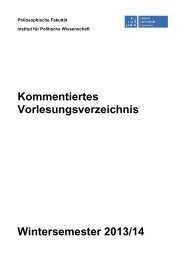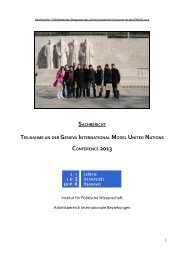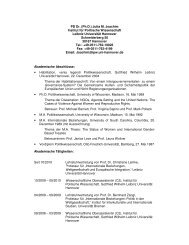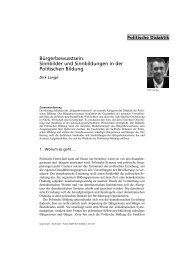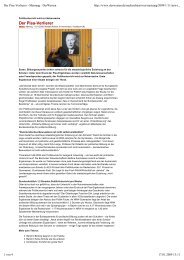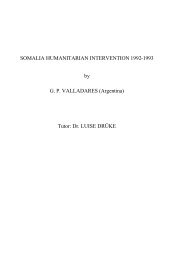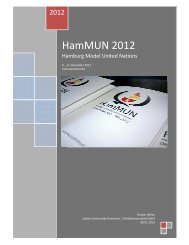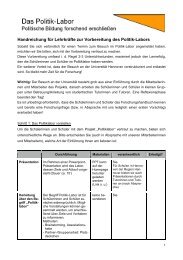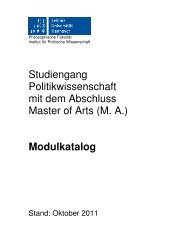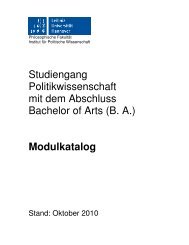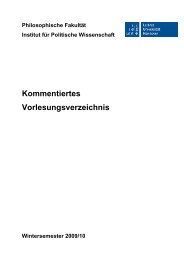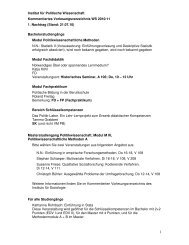Preventive Action for Refugee Producing Situations
Preventive Action for Refugee Producing Situations
Preventive Action for Refugee Producing Situations
Create successful ePaper yourself
Turn your PDF publications into a flip-book with our unique Google optimized e-Paper software.
196 Chapter 5<br />
not be simply that we do what the law tells us, but that our actions are well<br />
founded, necessary, morally justifiable, and politically sound. 45 1<br />
It is all very well to pass resolutions that call on oppressive or authoritarian<br />
regimes to change practices that they have established to systematically inflict<br />
harm upon its citizens. The real burden, however, falls on the shoulders of<br />
those who must implement the resolutions - governments, international<br />
organizations, and especially, human rights and relief workers in the field.<br />
Secretaries-General, UN individual officials, and organizations have all, in fact,<br />
taken initiatives in the past to tackle specific situations within the territory of<br />
member states, with or without the consent of the state concerned. They have<br />
been able to do this out of concern that the situation, if left unchecked, would<br />
create or dramatically increase refugee flows. These initiatives, despite the<br />
states' initial argument about national security, were approved ex post facto by<br />
the community of states, through such bodies as the U.N. Security Council, the<br />
General Assembly, ECOSOC, and the Executive Committee of the UN High<br />
Commissioner's Program. 452 To be successful, these initiatives must be based<br />
on vision, good judgment, and courage. Once practical actions have been taken,<br />
overcoming states' objections, an important precedents is established on<br />
subsequent legal decisions can be based, particularly in individual cases.<br />
Moreover, these initiatives and practices can serve as precedents in drafting<br />
national and international codes of law.<br />
There<strong>for</strong>e we recommend that alternative preventive action gain acceptance<br />
and overcome states' objections through practice, wherever possible in the<br />
absence of an explicit legal instrument providing the basis <strong>for</strong> it. In this way, an<br />
important body of precedents can be built up as<br />
_______________________<br />
451 In this sense we see the role of the UN not in the narrowly defined, restricted<br />
view, but support that in practice, its freedom <strong>for</strong> action be widened with the appropriate<br />
means. These means, some of which will be developed below, are<br />
designed not to antagonize governments but to find face-saving devices with international<br />
presence, to provide a link to the outside world, which can mean protection<br />
<strong>for</strong> potential victims and those, mainly local people, who are trying to<br />
protect the victims directly within their country. By representing an international<br />
conscience the UN and other international workers can make it a matter of selfinterest<br />
<strong>for</strong> states to make concessions <strong>for</strong> the sake of their <strong>for</strong>eign policy image.<br />
452 Examples include "U Thant initiierte spontan, ohne ein ausdrückliches Mandat,<br />
die UNDPRO (United Nations East- Pakistan Relief Operation), nachdem er vergebens<br />
an den Sicherheitsrat appelliert hatte, "to stem the tide of human misery<br />
and potential disaster." See A. Pauer, p. 162; See also UN GA res. 3454 (XXX) 9<br />
Dec. 1975. UNHCR's initiative to assist Vietnamese displaced persons within<br />
their country.<br />
Legal Justification 197<br />
states become accustomed to these types of actions. Aside from relying on the<br />
U.N., the argument of domestic jurisdiction may be further rebutted by judicial<br />
decisions of regional or international courts that a state does accept, thereby<br />
conceding limitations on its internal jurisdiction. 453<br />
For the first time, a regional court recently made a judgment that the<br />
concerned government accepted:<br />
In the first verdict of its kind, the Interamerican Court of Human Rights today found the<br />
Honduran Government guilty in the disappearance of a Honduran citizen in 1981. 454<br />
This court and arm of the Organization of American States "ordered Honduras<br />
to pay damages to the victim's family." 455 The government of Honduras has<br />
accepted this verdict, according to a spokesman <strong>for</strong> President Jose Azcona<br />
Hoyo, who announced:<br />
Velasquez's family will be compensated by the state because Honduras faithfully complies<br />
with the obligations under international agreements. 456<br />
One of the seven judges, Mr. Buergenthal, an American law professor,<br />
commented on the significance of this decision: The Court's verdicts were<br />
effective "because they cannot easily be written off as propaganda. If the<br />
countries we find in violation receive economic aid from places where value is<br />
placed on preserving human rights, then our verdicts could be of some<br />
significance." 457 Moreover domestic public pressures to make nations con<strong>for</strong>m<br />
to international standards of behavior are growing stronger, which contributes<br />
further to the erosion of the "reserved domain." 458<br />
___________________________<br />
453 According to Article 63 of the American Convention on Human Rights "Pact of<br />
San Jose, Costa Rica," Chapter VIII, the Inter-American Court of Human Rights<br />
shall rule that the consequences of the measure that constituted the breach be remedied,<br />
if there has been a violation of a right protected by this Convention.<br />
454 "O.A.S. Tribunal Finds Honduras Guilty in Political Killings, a First", The New<br />
York Times, 30 July 1988.<br />
455 "O.A.S. Tribunal finds Honduras guilty," The New York Times, 30 July 1988.<br />
456 "Honduras agrees to pay family of student," Boston Globe, 31 July 1988.<br />
457 "O.A.S. Tribunal finds Honduras guilty," The New York Times, 30 July 1988.<br />
458 458 M.S. Rajan, The Expanding Jurisdiction of the United Nations, (New York:<br />
Oceana Pubications, New York, 1982), p. 234



